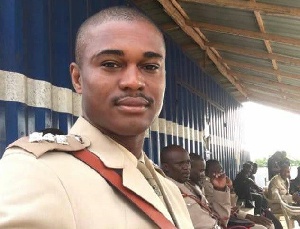Opinions of Thursday, 1 June 2017
Columnist: Joseph Ackon-Mensah
Mob justice: Will Captain Mahama be the last?
We got hard hit, at least, for the rest of us Ghanaians with heart, when the inhumane murder of the Army Captain Maxwell Mahama, who was on an official assignment in the Diaso area in the Central Region was sadly relayed to us.
He was not attacked by armed robbers. He was lynched! He met his untimely death in the hands of a group of people at Denkyira Boase who appropriated to themselves the powers of the law enforcement agencies and the judiciary. They tried him in the very court of their charged minds, passed their own judgment on him, and that settled it for them.
It is called mob justice! The extrajudicial action, commonly called lynching, has been one of man’s lowest level of reasoning across societies the world over. When carried out, you can picture a human group that stands at par with that carnivore in the forest that we hear of and dread. In the late nineteenth to the early twentieth centuries in the United States, lynching was a lucrative venture for marauding White supremacists who executed instant justice on helpless Blacks.
What qualified a Black to be lynched was a simple suspicion that a Black is a criminal. Even Black right activists, both Whites and Blacks, were not spared. What is clear is lynching has been a tool used by its practitioners to deal decisively with those they perceive evil and unwanted.
Here in Ghana, our history and our contemporary times have not been spared of the gruesome act. Some have been lynched in this country at places where residents deemed them strangers walking around, suspecting them of the usual chorus: ‘acting strangely’, and a code signalled.
What strange acts are is something yet to be defined. Others have been lynched in this country because they were thought of as witches. Also in this case, the parameters in determining who a witch is has not been properly laid out yet. Very commonly in our Ghanaian societies, when locals grab a suspected robber, the probability that the robber will be lynched is high. If luck embraces him or her on a day, the robber may only have severe beating without dying before the police take over.
In my life, I have come across a young man who had both palms nailed on a coconut tree in an ancient Roman crucifixion style for allegedly stealing someone’s coconut. He struggled with the pain for a while and died. The question has been what makes people engage in mob justice. Mind you, the perpetrators are both males and females.
Several reports and expert analysis have attributed the heartless acts to people’s lack of trust in our security agencies and our justice systems. People will say they do not understand why a robber or a suspected criminal arrested in the act should be allowed to walk freely on the streets.
They feel that our justice system has not been dealing with criminals in the way they think they must be dealt with. Despite the fact that our police and courts have their own flaws, what these people fail to realise is a person is not guilty until proven so by a court of competent jurisdiction. We must also admit that, as a society, we have failed badly to educate the people.
It is worrying to think of what practically an institution like the National Commission for Civic Education (NCCE) is doing in the form of public education to let citizens understand some basic laws as well as rights and responsibilities. We live in a country of religion: divided into a majority Christian, followed by Muslims, traditionalists and others.
The basic thing in religion is to make its adherents live lives worthy of attracting the favour of the being worshipped. And that will mean living morally upright lives. However, after trooping into churches, mosques, shrines and others, we still remain detached from basic moral standards.
A moral person does not only occupy himself with basic good and bad deeds, but also loves his neighbour as himself. By extension, I cannot look at my fellow human being and hit his skull with a piece of brick or stone. That makes me descend to the level of animals in a jungle.
This makes us ask: “What are people preached to?” What practical training and knowledge is our educational curriculum equipping its consumers with? Our textbooks are pregnant with civic theories that are only meant to be memorised and later poured on sheets of paper for marks to get graded.
Our educational system has failed to churn out products that have respect for our laws and civic responsibilities. Thus, it is not strange to find a person with degrees and in suit openly or secretly defending or offering support in the perpetuation of mob justice.
It is time our police showed the citizenry their unflinching resolve to deal with these self-styled executioners walking on the streets of Ghana in line with the laws of the land. Again, the prosecutors of crime and the courts should expedite criminal cases before them since dragging them courts unnecessary public upheavals.
Until citizens respect the laws, respect the dignity of their fellow human beings irrespective of wherever they come from, their profession, their differences; until our security forces stand up to this menace and until our justice system gains appreciable trust from the people, the lynching of the late Captain Maxwell Mahama may not be the last in Ghana.
Author: Joseph Ackon-Mensah (Email: ackonmensahj@yahoo.com)













